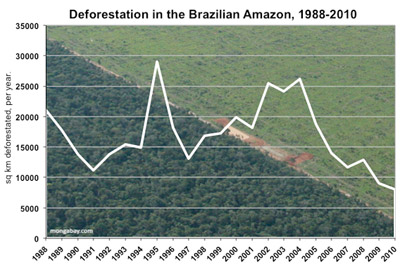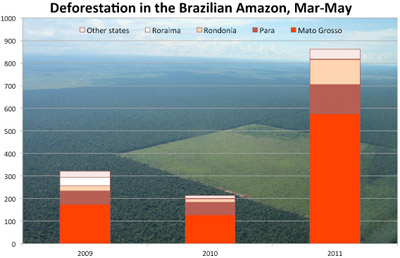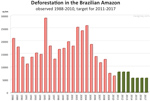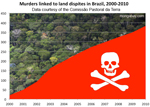|
Perspectives on proposed changes to Brazil’s Forest Code |

The recent decision by the U.S. to dump domestic corn ethanol subsidies and tariffs on imported ethanol could be a boon to Brazil’s biofuel industry, especially sugarcane ethanol producers. But the move could put added pressure on Brazil’s cerrado and Amazon rainforest ecosystems.
Proposed changes to Brazil’s Forest Code will hurt Brazilian agriculture, argues a leading conservationist.
Carlos Alberto de Mattos Scaramuzza, WWF-Brazil’s director for conservation, says the reform bill currently being evaluated by Brazil’s Senate could have unexpected economic implications for Brazilian ranchers and farmers. Scaramuzza says a bill that grant amnesty for illegal deforesters and sanctions expanded destruction of the Amazon rainforest would make Brazilian agricultural products less attractive in foreign markets.
“The tendency in the world market is to expand the space for sustainable products, and consumers are increasingly averse to acquiring anything whose production involves the destruction or degradation of Nature”, said Scaramuzza.
The Brazilian agricultural sector has experienced market backlash their products before. In 2006 soy crushers were hit by the threat of a boycott by McDonalds due to the fast food chain’s concern over being associated with deforestation. In 2009 the Brazilian cattle industry has hit by a Greenpeace campaign that targeted major consumer products brands that source leather from Brazil. In both cases, affected producers moved to adopt stronger safeguards to eliminate deforestation from their production cycle.
Scaramuzza says that the bill, if passed in its current form next month, could also undermine the nascent market for ecosystem services. Brazil, with its ample forests and water resources, is poised to become a giant in the market, which some analysts believe could be worth tens of billions of dollars a year by mid-decade.
 Deforestation has fallen dramatically in Brazil since 2004…  … but there are troubling signs this year that progress has reversed. |
“The project completely ignores the possibility of remuneration for the provision of environmental services, thereby slamming the door on an interesting opportunity to diversify income,” he said, adding that reforestation of degraded forest areas — as required under the current Forest Code — would both “protect natural resources” and “open up the possibility of new income stemming from the provision of environmental services related to combating climate change and maintaining water supplies for cities and rural areas alike.”
Scaramuzza adds that the bill could hurt Brazilian agriculture by degrading the very services upon which farming and ranching depend. For example, the proposed bill would allow clearing of forests on hillsides and mountaintops, while reducing the buffer zone along waterways. Deforestation in these areas would exacerbate soil erosion and reduce the availability of clean water. Erosion could further worsen flooding and reducing power generation from hydroelectric plants, according to Scaramuzza.
“The losses in question transform the issue of approving the Forest Code reform bill into another tremendous loss of an opportunity to guarantee that Brazilian production will be founded on more sustainable bases,” he said. “If… our products are to be associated to deforestation and exacerbation of global warming, we will eventually lose access to [international markets].”
“The House of Representatives is looking at the rear-view mirror, at the past instead of the future. We should be looking to the promising green markets and to achieving a low carbon economy.”
WWF is among the groups lobbying for a reappraisal of the bill’s text. A broad coalition of environmentalists, scientists, and rural land rights groups have called for a delay in the Forest Code vote to allow more time to conduct a thorough review of its potential implications on the Brazilian economy and environment.
Related articles
Prominent scientists condemn proposed changes to Brazil’s Forest Code
(07/07/2011) A group of prominent scientists has condemned a bill that will potentially weaken Brazil’s environmental laws.
Forest Code bill could undermine sustainable growth in the Amazon

(07/06/2011) In May Brazil’s House of Representatives passed a bill that will reform the country’s Forest Code, which requires farmers and ranchers in the Amazon to maintain a legal forest reserve amounting to 80 percent of total landholdings. Environmentalists say the bill, which is undergoing revision before heading to the Senate next month, would weaken the forest code, granting amnesty for illegal deforestation of up to 400 hectares per property and allowing clearing of forests along waterways and on hillsides — restrictions meant to limit erosion and damage to watersheds.
Brazilian senator: Forest Code reform necessary to grow farm sector

(07/06/2011) Over the past twenty years Brazil has emerged as an agricultural superpower: today it is the largest exporter beef, sugar, coffee, and orange juice, and the second largest producer of soybeans. While much of this growth has been fueled by a sharp increase in productivity resulting from improved breeding stock and technological innovation, Brazil has benefited from large expanses of available land in the Amazon and the cerrado, a grassland ecosystem. But agricultural growth in Brazil has always been limited — at least on paper — by its environmental laws. Under the country’s Forest Code, landowners in the Amazon must keep 80 percent of their land forested.
Brazilian government: Amazon deforestation rising
(06/30/2011) Satellite data released today by the Brazilian government confirmed a rise in Amazon deforestation over this time last year.
Revised Forest Code may cost Brazil climate commitments

(06/14/2011) The proposed revision of Brazil’s Forest Code could prevent the country from meeting its lower emissions target and is unlikely to ease rural poverty, concludes a new study by the Brazil-based Institute of Applied Economic Research (IPEA).
Majority of Brazilians reject changes in Amazon Forest Code
(06/11/2011) The vast majority of Brazilians reject a bill that would weaken Brazil’s Forest Code, according to a new poll commissioned by green groups.
Rash of murders threatens to silence environmental and social activism in Brazil

(06/10/2011) Authorities in Brazil have sent an elite police force consisting of 60 officers to offer protection to environmental activists in the Amazon after a series of killings, reports the Associated Press. The move comes 10 days after Brazil’s Vice President Michel Temer announced the creation of a working group on Amazon violence following the assassinations of three activists in the region in late May. The Brazilian Amazon is no stranger to systemic violence against environmental activists, yet the response from the federal government in the past two weeks is the most significant to date.

(06/03/2011) As an American I know a lot about shame — the U.S. government and American companies have wrought appalling amounts of damage the world over. But as an admirer of Brazil’s recent progress toward an economy that recognizes the contributions of culture and the environment, this week’s decision to move forward on the Belo Monte dam came as a shock. Belo Monte undermines Brazil’s standing as a global leader on the environment. Recent gains in demarcating indigenous lands, reducing deforestation, developing Earth monitoring technologies, and enforcing environmental laws look more tenuous with a project that runs over indigenous rights and the environment.
Assassinations of environmentalists continue in Brazil’s Amazon, deforestation rises

(05/28/2011) A community leader in the Brazilian Amazon was slain Friday just three days after two environmentalists were killed in a neighboring state, reports Reuters. Adelino “Dinho” Ramos, the president of the Movimento Camponeses Corumbiara e da Associação dos Camponeses do Amazonas, a small farmers association, was gunned down front of his family Friday morning in Rondônia. Brazil’s Special Secretariat for Human Rights, an office of the president, said it was unclear who killed Ramos, who had received death threats from loggers.
10 former environment ministers ask Brazil to hold off on Forest Code vote
(05/24/2011) Ten former environment ministers weighed in on Brazil’s looming vote on the forest code governing land use in the Amazon rainforest.